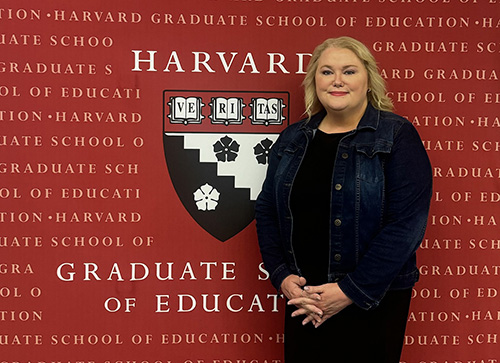CAMBRIDGE, Mass. – There is nothing like a week of specialized training at an Ivy League school to strengthen leadership skills and help a person to feel energized.
Charlene Widener, Northeast vice president of educational services, did just that last month at the Harvard Management and Leadership Institute.
Applicants from around the world were reviewed and accepted into the Harvard Graduate School of Education and chosen from both two-year and four-institutions.
And while Harvard might enjoy a lofty reputation in academic circles, the institute was down-to-earth, Widener said. Right from the start, it included conversations about the challenges that education is facing including the enrollment cliff, student mental health, public perception of higher education, and fiscal stability.
Widener said it was interesting to see perspectives from other countries, which allowed for broader conversations. Of the 91 people who attended, Widener was one of six community college representatives and the only one from Nebraska. There were a few others from the Midwest, including Kansas State University and Iowa State University.
“One of the interesting things about the institute was the people that were there were not just from public institutions,” Widener said. “I would say at least one-third of them were from private institutions, including a participant from Harvard and one from Emerson College. Participants also included individuals from The Citadel and the U.S. Air Force Academy.”
Private school representatives noted how scholarships have increased for private institutions. Cost is a factor, with many private schools helping more students with endowments and scholarships to ensure enrollment numbers.
“That was just one of the indicators that was looked at to show how the popularity of higher education has fallen,” Widener said.
Community colleges serve a different population.
“While a portion of our students transfer to four-year colleges, community colleges serve their regional workforce partnerships as we do. Exploring these complementary roles in higher education was another of the conversations we were able to have,” she said. “It was really a robust conversation about supporting each other through a turbulent time in higher education.”
At a community college, a full-time student can attend for $8,000 to $9,000, while costs for a state college or university are double that – or more. And it keeps going up.
Community colleges have their own challenges, including serving students who have limited funds or need additional support in English or math.
“It is a different kind of service that the community colleges provide than the four-year institutions,” Widener said. “Even for students who do want to transfer, coming here and paying less for those two years allows them to the opportunity to be successful at the college level with additional supports and small class sizes, while being supported by faculty members who love to teach and are dedicated to helping students succeed before students transition to a four-year institution (in some cases). Community colleges play such a significant role in setting students up for success.
“It is possible for a community college student to go here for two years and then go on to even some of the most prestigious institutions in the country, including Ivy League institutions.”
Widener said she feels great about the work that is being completed at community colleges and the diversity of interests served. Some students want to learn a trade, some just want to explore education, some want to transfer. The reasons are varied, but they all get support.
“That is why I have dedicated my career to working at community colleges. I am a product of community colleges. I know what they can do for students, including helping them to be successful when they transfer if they choose to go to another college. But also ensuring that students are equally successful if they go into the workforce next. The power of the community college is that it is instrumental in changing students’ lives.”
Harvard Leadership Training
Charlene Widener, Northeast vice president of educational services, attended a seven-day institute at Harvard for education administrators, finding a lot in common with participants from around the world. (Courtesy photo)
###

